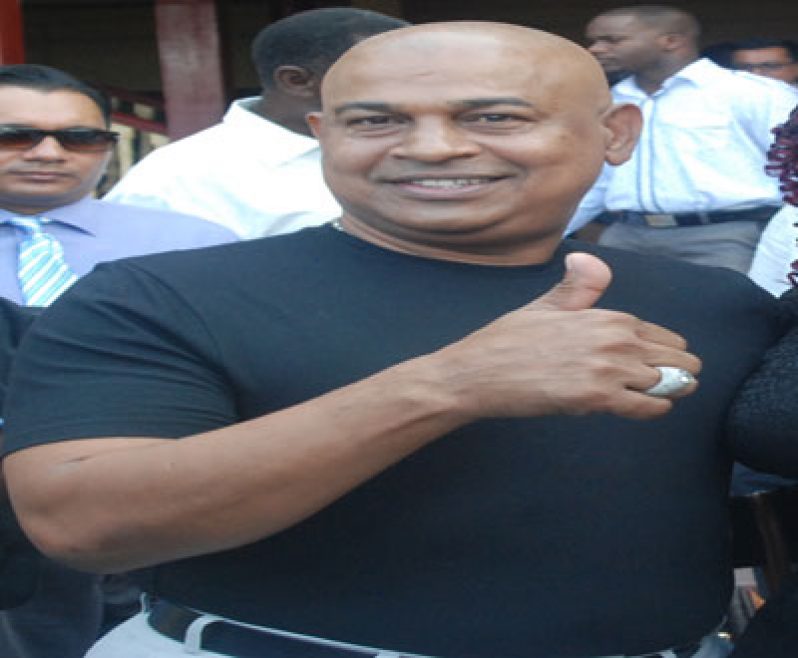SENIOR officials from A Partnership for National Unity (APNU) and the Alliance for Change (AFC) could be the subject of Kaieteur News’ headlines in the coming days.
This is according to a source close to the embattled local daily, who told the Guyana Chronicle that the newspaper’s publisher, Mr. Glenn Lall, is in possession of recordings of private conversations between reporters attached to the newspaper and senior officials of the main Opposition, APNU, and the AFC.
This newspaper was informed that the recordings in Lall’s possession address both work-related and personal matters.
The source added that conversations involving AFC Leader, Mr. Khemraj Ramjattan, and AFC Executive Member, Mr. Moses Nagamootoo are “on hold” given that the two men are involved in Lall’s legal defence related to the recent disclosure of a 19-minute recording.
Last Monday, Lall released a 19-minuute recording of the private conversation on October 25 between Attorney-General (AG) and Minister of Legal Affairs, Mr. Anil Nandlall and senior Kaieteur News reporter, Mr. Leonard Gildharie. He subsequently made a report to the Deputy Police Commissioner, Mr. Balram Persaud, premised on the contention that the contents of the recording indicate that his life, the lives of his family and staff members are under threat.
Questions are being asked about how Lall came into possession of the recording, if indeed it was recorded by the reporter – a possibility that constitutes a legal infraction.
Questions are also being asked under what circumstances the telephone conversation was recorded – whether it was a recording or a result of wiretapping activities – another legal infraction.
Additionally, Lall himself, since releasing the 19-minute recording, admitted that the conversations on the phones he gives to his employees are recorded, be they private conversations or related to the business of the local daily.
This debacle follows concerns being raised only last week over Lall’s illegal surveillance of the phone calls and other communications of his staff, Government officials, as well as private Guyanese citizens.
PRIVACY CONCERNS
Meanwhile, it was only one month ago that Guyana Chronicle made public the concerns of Government and Opposition Members of Parliament, as well as public servants and stakeholders in the private sector, over the privacy of confidential personal communications.
APNU’s General Secretary, Mr. Joseph Harmon had told the Chronicle that there have always been “serious concerns” about the security of communication between people.
“We have even had cases where communication between our party members are hacked, and the question is how are they accessed…whether we had the capacity here to do so or not is something I am not sure of,” he said.
Harmon stressed that the privacy of information and communication exchanges ought to be treated as private. “Every email you send passes through a network and if this is information that comes into the hand of someone, you have to know how to treat with it. The privacy of your communications must be protected,” he said.
According to him, this problem is something that can be looked at in the Parliamentary Committee, reviewing the moves to address reforms in the telecoms sector. “Since the committee’s work is not complete, we can look into this and see if and how we can provide protection to the Guyanese people,” Mr. Harmon stated.
The AFC Leader had also expressed strong sentiments on the matter and was firm in his contention that laws related to privacy, confidentiality and security of online communications must be enforced.
“All the laws related to privacy must be enforced …we are filled with laws, we have no deficiency of laws, but they are not adhered to,” Ramjattan said.
Noteworthy, according to the ‘Reporter’s Handbook: Invasion of Privacy and the Media: The Right To Be Let Alone’, invasion of privacy by intrusion is defined as: “One who intentionally intrudes, physically or otherwise, upon the solitude or seclusion of another or his private affairs or concerns, is subject to liability to the other for invasion of privacy, if the intrusion would be highly offensive to a reasonable person,” – a principle that underscores the ethics of journalistic practice.



.jpg)











